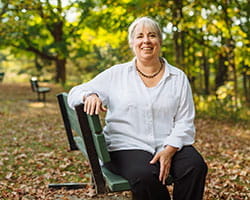
This is a reality for many individuals in upstate New York and one that Dr. Susan Barber Skinner ’17, a PhD in Psychology graduate and Walden Alumni Ambassador, has become all too familiar with as she works to develop solutions relating to the health effects of poverty and sleep behavior.
Skinner earned a master’s degree in clinical mental health counseling in 2008 from Union Institute & University while pursuing work as an independent researcher and grant writer for mental health nonprofits. Afterward, she served as a counselor and a clinician for addiction recovery and family preservation agencies in the Adirondack region of New York.
As a clinician, she worked with a young, low-income father of five who was battling to maintain custody of his children. Among the issues was his choice to not let his children nap. He hoped that if the children did not sleep during the day, then they would fall asleep earlier in the evening. Instead, they were struggling to stay awake in school.
This case opened Skinner’s eyes to the negative health outcomes linked to rural environments and poor sleep. Many of her clients were unable to focus on their own health or that of their children because there were so many other things going on in their lives. Skinner decided she wanted to focus on her independent research to develop impactful solutions to these issues and help this rural population prioritize their own health.
“I’ve always been interested in doing research to get a sense of the big picture of what might help an individual or a family move forward,” Skinner says. “Looking at the larger context of sleep behavior allowed me to explore commonalities among populations and develop strategies to help.”
As part of her Walden dissertation, Skinner conducted qualitative research on the lived experience of sleep among young adults living in rural poverty. Out of a dozen people in her study, seven indicated they had limited ability to control their sleep environment due to homelessness or substandard housing conditions.

“Your sleep schedule is dependent on with whom or where you’re living, so any control you have over it is limited by your ability to create a healthy sleep environment,” she says.
Skinner is exploring the development of sleep hygiene programs to educate people about the importance of sleep and provide them with useful resources. She’s participating on a subcommittee for Community Conversations on Poverty in St. Lawrence County, which has given her great insights into people’s experiences relating to food security and housing. She is also pursuing a collaboration with the Empire State Poverty Reduction Initiative to conduct community-based action research.
With its rigorous academic standards and challenging curriculum, Walden has given Skinner the analytical tools necessary to create positive social change in her community, she says. While working on her dissertation, Skinner conducted interviews at Head Start programs, and she is working on developing a protocol for sleep hygiene that Head Start can use in workshops.
“Walden taught me to approach clinical situations as an academic scholar rather than just a practitioner,” she says. “I’m confident in my ability to conduct and implement research projects because of the support I received at Walden, which will help me in my mission to amplify the voices of those living in rural poverty.”



